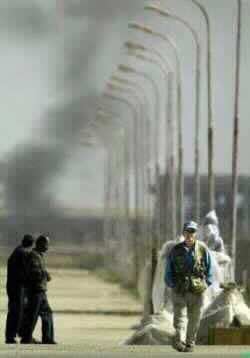Iraq has made no decision yet on a U.N. order that it destroy its Al Samoud 2 missile program, Iraq's chief liaison to U.N. inspectors said Sunday as inspectors visited plants involved in producing the missile. With U.S. troops massed on Iraq's doorstep ahead of possible war, Gen. Hossam Mohamed Amin told journalists that destroying the missiles would hurt Iraq's defenses, but not fatally so.
It "would affect our fighting capabilities, but it would not finish them or affect them greatly," he said. "This missile represents only one aspect of our defensive capabilities."
Baghdad's decision on the Al Samoud 2 missile will likely be a factor as the U.N. Security Council weighs a new Iraq resolution that Washington and London are expected to present Monday as they seek support for possible military action.
Amin repeated Iraq's claims that it is "clean" of weapons of mass destruction and insisted no new U.N. resolution is needed "because Iraq is cooperating with the inspectors."
Chief U.N. inspector Hans Blix ordered Friday that a U.N.-supervised destruction of all Al Samoud 2 missiles, warheads, fuel, engines and other components must begin by March 1.
The missiles exceed the 93-mile range limit set by U.N. resolutions adopted at the end of the 1991 Gulf War . Iraq says some of the missiles tested flew beyond the limit because they were not weighed down by guidance and other systems.
"This issue is under study from the Iraqi side," Amin said, "and we hope it will be resolved peacefully without the interference of others, particularly the Americans."
Weapons inspectors on Sunday visited two sites outside Baghdad connected to the Al Samoud 2 - the Al Fatah facility, which makes components of the missile's guidance systems, engine and airframe, and the Al Rafah facility, which tests engines.
U.N. Secretary-General Kofi Annan said Sunday he was confident that Iraq would agree to destroy the Al Samoud 2.
"If they refused to destroy the weapons, the Security Council will have to make a decision," Annan told reporters in Turkey.
"I don't see why they would not destroy them."
U.N. inspectors estimate that Iraq has between 100 and 120 Al Samoud 2s, diplomatic sources said on condition of anonymity.
Amin said Iraq officials had proposed U.N. experts choose an Al Samoud 2 missile at random and launch it to test the maximum range. "We are sure it will be less" than 93 miles, he said. "But we didn't receive any reply on our proposal."
The Iraqi general said the government was "facilitating all the needs of the inspectors."
He said Iraq has begun to dig trenches at sites where it unilaterally destroyed chemical and biological weapons so that U.N. inspectors can examine the soil for proof of its action. He said a U.N. team was due in Baghdad on March 2 to examine the sites.
Chief inspector Blix expressed skepticism over Iraq's claims to have destroyed the stocks of anthrax and VX nerve agent. Baghdad says it does not have records of the destruction.
In an interview with Time magazine due to be published Monday, Blix said he found it "a bit odd" that Baghdad, with "one of the best-organized regimes in the Arab world," would claim to have no documentation.
Amin also highlighted Iraq's agreement to let American U-2 spy planes fly over its territory to support the work of the inspectors.
He said he expected French Mirage planes to also begin flying in the next two days and that Iraq was discussing the use of German drones as well.
The United States and Britain accuse Iraq of developing weapons of mass destruction and long-range missiles despite U.N. bans on both. Iraq denies holding such weapons and says its enemies have their eyes on Iraq's oil and on world domination.
Former Russian Prime Minister Yevgeny Primakov flew into Baghdad on Saturday night, a source in Baghdad told The Associated Press.
Primakov, who forged close ties with Baghdad as a former Soviet minister, has mediated in Iraq on several occasions. However, his mission to Baghdad in a bid to prevent the 1991 Gulf War ended in failure.
The source did not give details of Primakov's mission, but Russia's respected Echo of Moscow radio, citing a source in Russian President Vladimir Putin 's administration, called Primakov's trip a confidential mission at Putin's request. Russia's ITAR-Tass news agency carried a similar report.
Amin suggested Iraq won't allow its scientists to leave the country to speak to U.N. inspectors, as the U.N. wants.
Inspectors believe scientists will be more candid if removed from Iraqi officials.
"We think it is not necessary to conduct interviews outside Iraq," Amin said.
In addition to the missile-related installations, U.N. inspectors on Sunday also visited a military engineering facility south of Baghdad, an electronics research company and a deodorant factory in Baghdad, Iraq's Information Ministry said.
A team visiting the northern city of Mosul went to a veterinary college and a company that makes soft drinks, it said.
Meanwhile, the U.N. Children's Fund and Iraqi health workers began a five-day campaign Sunday to vaccinate 4 million Iraqi children against polio . Thousands of health workers spread across the country, going from door to door, to vaccinate Iraqi children under the age of 5.
Carel de Rooy, UNICEF's representative in Iraq, said the campaign was routine and had nothing to do with a possible war.
PHOTO CAPTION
A United Nations weapons inspector walks inside a missle facility where they produce components for Al Samoud missles near Karbala, Iraq as smoke from burning oil drums rises in the background Sunday Feb. 23, 2003. Chief weapons inspector Hans Blix has said that the destruction of dozens of Al Samoud missiles, which exceed U.N. range limits, must begin by March 1. (AP Photo/David Guttenfelde
- Author:
& News Agencies - Section:
WORLD HEADLINES


 Home
Home Discover Islam
Discover Islam Quran Recitations
Quran Recitations Lectures
Lectures
 Fatwa
Fatwa Articles
Articles Fiqh
Fiqh E-Books
E-Books Boys & Girls
Boys & Girls  Articles
Articles










